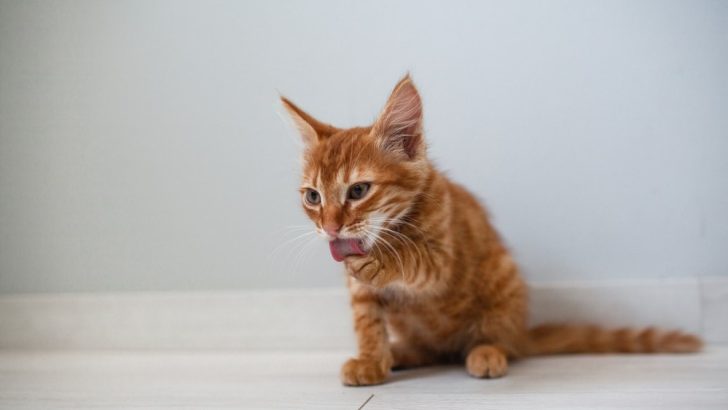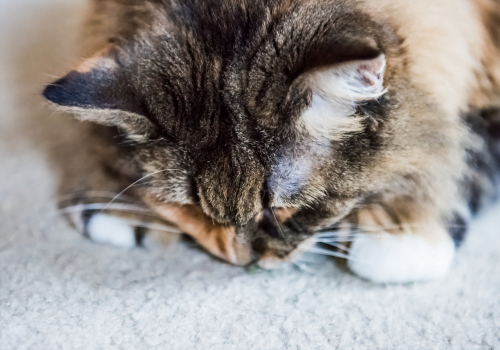Have you ever caught your feline friend enthusiastically lapping up the floor, seemingly oblivious to the fact that it’s not a bowl of milk? While it may seem strange or even unsanitary, this peculiar behavior is actually pretty common among cats. But why do they do it? Is your cat trying to tell you something? Understanding the reasons behind your cat’s floor-licking can provide valuable insights into their well-being and offer opportunities to enhance their daily life.

Image: catschef.com
Let’s dive into the world of feline floor-licking, exploring the potential motives behind this curious behavior, and offering practical tips to address any underlying concerns.
Deciphering the Meaning of Your Cat’s Floor-Licking
There are a number of reasons why your cat might be licking the floor, each with its own implications:
1. Cleanliness and Hygiene:
- A Primal Instinct: Cats are meticulous creatures with an innate need for cleanliness. Their tongue, with its rough surface and backward-facing papillae, acts like a tiny brush, effectively removing dirt and debris. You may find your cat licking a floor they perceive as unclean, perhaps after a spill or a dust bunny has settled.
- Marking Territory: Cats lick floors to leave their scent, marking their territory and communicating with other felines. This behavior is a natural way for them to establish dominance and boundaries within their environment.
2. Nutritional Deficiency:
- Craving Minerals: Cats may lick floors in search of essential minerals, particularly those found in salt. This behavior is often seen in cats with dietary deficiencies, especially those whose diets are low in salt or other essential nutrients. If your cat is constantly licking the floor, it might be a sign to consult your veterinarian about their diet.
3. Stress and Anxiety:
- Displacement Behaviors: Just like humans find ways to cope with stress, cats can resort to “displacement behaviors.” This refers to behaviors that are often unrelated to the stressor itself, such as excessive grooming or licking. Floor-licking can be a way for a stressed cat to self-soothe and release some built-up tension.
- Environmental Changes: Cats are creatures of habit and can experience anxiety with changes in their environment. A new pet, a move, or even a change in furniture arrangement can trigger stress and lead to floor-licking.
4. Medical Conditions:
- Gastrointestinal Issues: Floor-licking can be a symptom of digestive problems in cats, such as gastrointestinal upset, pancreatitis, or even a parasite infestation. If you notice your cat licking the floor excessively, especially when accompanied by other symptoms like vomiting, diarrhea, or loss of appetite, consult your veterinarian.
5. Boredom and Stimulation:
- Mental Enrichment: Cats are naturally curious and playful creatures. If they are bored, they may engage in unusual behaviors, including licking the floor, to find stimulation. Providing enough mental and physical enrichment, such as interactive toys or scratching posts, can help prevent boredom-induced behaviors.
Understanding Your Cat’s Licking Habits
To truly understand the motivation behind your cat’s floor-licking, it’s important to observe their behavior closely. Consider factors like the circumstances surrounding the licking, the frequency, and whether it’s a recent development. For example, if your cat is licking the floor after playing, it might be a sign of stress relief. However, if they are constantly licking and showing other symptoms like lethargy or loss of appetite, it could be a sign of a medical problem.
Turning Floor-Licking into a Learning Opportunity
While you might find your cat’s floor-licking an amusing quirk, it’s important to understand its potential roots. Here’s how to address this behavior and make sure your cat is happy and healthy:
1. Providing a Clean Environment: Maintain a clean and clutter-free environment. Vacuum regularly, especially in areas where your cat frequently hangs out. You can also use pet-safe cleaning products to remove any lingering odors or allergens that might be attracting your cat to the floor.
2. Enriching Their Life: Offer your cat plenty of toys, scratching posts, and interactive devices for mental and physical stimulation. Engage them in play sessions and offer puzzle feeders that challenge their cognitive abilities.
3. Addressing Nutritional Needs: Consult your veterinarian about your cat’s dietary requirements. They can recommend a diet tailored to your cat’s age, breed, and activity level. If your cat has a history of floor-licking, your veterinarian might suggest a diet enriched in essential minerals.
4. Eliminating Stressors: Identify and address potential sources of stress in your cat’s environment. Ensure they have safe spaces to retreat to, and consider diffusing calming pheromones to help reduce anxiety.
5. Seeking Professional Help: If your cat’s floor-licking is excessive, persistent, or accompanied by other symptoms, don’t hesitate to contact your veterinarian. They can help determine if there is an underlying medical condition that needs attention.

Image: petzone.blog
Why Is My Cat Licking The Floor
Putting It All Together: A Love Letter to Your Cat
It’s natural to be curious about your cat’s unusual behaviors, including the seemingly strange act of floor-licking. By understanding the potential reasons behind this behavior, you can work towards providing your feline friend with a happy, healthy, and stimulating environment. Whether your cat is simply being meticulous, craving minerals, or dealing with stress, your love and care will help them thrive.
Remember, understanding your cat’s language, no matter how peculiar it seems, is a testament to the bond you share and the deep connection that forms between humans and their furry companions.






